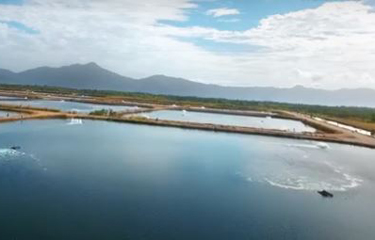Mick McMahon, the CEO of Darwin, Australia-based Seafarms Group, has resigned after nixing the company’s planned AUD 1.45 billion (USD 1.1 billion, EUR 941 million) shrimp-farming project.
The so-called Project Sea Dragon, which called for the company to develop facilities to grow up to 180,000 metric tons of black tiger shrimp annually, was deemed not viable in a review of the project led by McMahon.
McMahon’s resignation was announced by the company in a 6 May statement issued via the Australian Stock Exchange, where the company’s shares are traded. McMahon will be replaced as the company’s non-executive chairman by Ian Trahar, the company’s largest shareholder. Seafarms said it would be making an announcement regarding a new CEO “in due course.”
“Seafarms Group acknowledges the contribution that Mick has made during his tenure as a director and wishes him every success in the future,” the company said.
McMahon was under pressure after one of the company’ major investors, Avatar Industries, introduced a resolution on 22 April to remove McMahon from his posts with the company.
McMahon was hired in December 2021 with the goal of overseeing “a time of critical growth for Seafarms as it continues to finance and develop its world-class Project Sea Dragon.”
However, his review of the project found it lacked sufficient financing, that costs for the project had increased with global inflation, that its plan to build 10-hectare ponds was “unproven in Australia,” and its existing farming operations had “fundamentally underperformed.”
“Project Sea Dragon cannot proceed in its current form – there is no funding to proceed given failure of debt financing process,” the review found. ”In any event, the project review recommends against proceeding with PSD in its current form – it will not generate acceptable financial returns, the existing scope cannot be completed for targeted costs or achieve target completion dates, and the project currently involves unacceptable risk.”
The review instead called for a scaled-back pilot project to be built over the next three years. In its public announcements, Seafarms did not say how it plans to proceed with Project Sea Dragon.
Investors, including Tokyo, Japan-based conglomerate Nissui, have collectively committed more than AUD 200 million (USD 139.2 million, EUR 132.1 million) in funding over the past 10 years to advance Project Sea Dragon. An additional AUD 135 million (USD 93.9 million, EUR 89.1 million) had been allocated by Australia’s federal and regional governments for infrastructure upgrades to aid in developing the remote site in Legune Station, Western Australia, chosen for the shrimp farm.
Photo courtesy of Seafarms







